I made my first song list pretty soon after I started blogging. And once my blog began drawing some readers, I also began getting requests for themes for song lists. One theme (along with lullabies) that several people have requested over the years but which I’ve not yet been able to compile—till now, that is—has been that of the devotional song. The bhajan.
Mostly, I steered away from handling this theme because the most common and most popular bhajans just didn’t float my boat: I invariably found them too screechy and shrill. But as time has passed and I’ve been exposed to more devotional songs from the films of the 50s and 60s (in particular), I’ve realized that there are many bhajans that I do like. So, finally, a post. A list of ten devotional songs that I especially like. As always, these are from pre-1970s Hindi films that I’ve watched.
Note that my definition of a devotional song is one which is very specifically about a devotee addressing a deity or a higher power in a spirit of devotion. This is why I have left out all those many songs which use the Radha-and-Krishna theme where the devotion is tempered by romantic love (I know many would also regard that as devotion, too, but I wanted to make things a little more challenging for myself). Also, I include in this all forms of divinity, not necessarily Hindu, not necessarily in the form of idols. Plus, as I’ve mentioned earlier, the spirit of the song should be that of devotion: a song that is addressed to a deity but consists of spewing anger, for example, does not count (which is why an otherwise powerful song like Toofaan aur Diya’s Meri aan bhagwaan is not on this list).
Here goes, then. These songs are in no particular order.
1. Na main dhan chaahoon (Kaala Bazaar, 1960): I did say that this list is in no special order, but this one has to be at the top, because this is my very favourite bhajan. SD Burman’s music is lovely, Geeta Dutt (singing for Leela Chitnis) and Sudha Malhotra (singing for Nanda) sing this beautifully. And the lyrics—by Shailendra—are so powerful. Na main dhan chaahoon is not just a song of praise for a deity, but equally a song of morality. A song that urges mankind to remember that they entered the world with nothing and will leave it with nothing. A song that begs the deity to help the frail human ward off the temptations that surround one on each side, beckoning enticingly. A song urging one to higher thinking and simple living. A song that never fails to move me.
2. Tu pyaar ka saagar hai (Seema, 1955): In a somewhat similar tone to Na main dhan chaahoon is this lovely bhajan, sung by Manna Dey, from Seema. There is the same tone of a lost, wandering, helpless devotee, who thirsts for the way, the light—and the deity who is the only hope. The confusion and the bewildered state of the human can be soothed away and shown direction only by the ‘ocean of love’. I like the way the benevolence of the deity is highlighted in Tu pyaar ka saagar hai: this is not some terrifying god, distant from his/her devotees, but a kind, gentle, loving god.
3. Allah tero naam Ishwar tero naam (Hum Dono, 1961): Nanda again, and singing a song that isn’t just devotional, but is also one of Hindi cinema’s best-loved anti-war songs. Allah tero naam is also important in that it is one of the few songs that tries to bring two deities together: by putting Allah and Ishwar on the same pedestal, it attempts to forge communal harmony, emphasizing the fact that war destroys all, irrespective of community. Sahir’s lyrics are thought-provoking and beautiful, Jaidev’s music is excellent (far better than for the other bhajan from Hum Dono, Prabhu tero naam jo dhyaaye), and Lata’s voice brims with emotion.
(Interestingly, two songs from other films always remind me of Allah tero naam. Khuda-e-bartar teri zameen par zang ki khaatir, from Taj Mahal, and Ishwar Allah tere jahaan mein from 1947: Earth, are very similar to this song in tone, both appealing to a higher power to bring mankind to its senses and put an end to this mindless violence of war and riots. With Khuda-e-bartar, which was also written by Sahir, I have a feeling the lyricist was simply reiterating the same sentiment in somewhat different words).
4. Devtaa tum ho mera sahaara (Daaera, 1953): Daaera, a very unusual film, especially for its time, didn’t have many songs—but the standout song is this one, a bhajan that is sung every now and then in the little temple that abuts the haveli where Meena Kumari’s character finds shelter along with her old and ailing husband. This is an interesting devotional song in that the words can equally be addressed to a deity to whom one turns for succour and support, and to a lover to whom one turns for the same reasons. To the woman tottering under the weight of illness and an unwanted marriage, or to the young man deeply in love with a woman married to another—or to the devotee, floundering under the weight of crushing burdens—there is only the one support.
5. Parvardigaar-e-aalam tera hi hai sahaara (Hatim Tai, 1956): In a cinema that is dominated by Hindu devotional songs (or, at least, songs which are not expressly addressed to a deity of a faith other than Hinduism): a song addressed to Allah (this type of song is technically known as a naat). Hatim Tai is a fantasy film, full of fairies and other magical beings, the story based on that of the legendary Hatim Tai, famed for his generosity. Here, Hatim Tai (P Jairaj) sings a song of praise for the Almighty. The one who helps and saves us all, the one who is our sole support (interesting, here, to see the parallel with Devtaa tum ho mera sahaara). He goes on to list the many miracles the Almighty has wrought: Yunus was pulled out from the stomach of the fish, Ilyas was showered with mercy, Yusuf was released from prison. A way for Musa was made through the river (sic), and Isa was saved from the Cross.
An interesting run-down of miracles from Islam (and the Old Testament), and more than that, good music and a great rendition by Rafi.
6. Mann tadpat hari darshan ko aaj (Baiju Baawra, 1951): This bhajan is perhaps the first one I ever recognized as being a ‘good bhajan’ (before that, most of the filmi bhajans I’d come across were dreadful ones like Jai Santoshi maata). Mann tadpat hari darshan ko aaj has superb music, the lyrics—begging for a glimpse of the deity, a little morsel of mercy and benevolence—are excellent, and Mohammad Rafi… well, you can see why (or hear why) he was said to have ‘the voice of God’. What a controlled, beautiful rendition. From the slow, gentle (but utterly intense) start, to later in the song, when he’s joined by a chorus and his voice rises into a crescendo—and then sinks again, into a low, slow hymn: he is unforgettable all the way.
And, of course, I have to draw attention to something a lot of people often mention when talking of Mann tadpat hari darshan ko aaj: that the three main people involved in the creation of this classic bhajan—lyricist (Shakeel Badayuni), music director (Naushad) and singer (Mohammad Rafi)—were all Muslims.
7. Ae maalik tere bande hum (Do Aankhen Baarah Haath, 1957): Another classic song of devotion. Like Tu pyaar ka saagar hai and Na main dhan chaahoon, this one too does not beg the deity for wealth or miracles: instead, it asks for grace. For the strength to resist temptation, the support to stand up against tyranny (not by seeking vengeance, but by returning hate with love—the theme of this film). The longer (male) version of Ae maalik tere bande hum, ‘sung’ by V Shantaram and chorus, has a rawer feel to it but Lata’s has, I think, more feeling.
8. Tumhi ho maata pita tumhi ho (Main Chup Rahoongi, 1962): What is God? A friend. A parent, a never-failing companion. The one who is always there. The boat, the boatman. The one who helps you across, the one who shows you the way.
I have had friends and acquaintances tell me they don’t believe in God (which is fine with me: to each their own), but to me, the comfort offered by faith is what buoys me up through the worst of times. That is what draws me to this song: it reflects my belief in a divinity which is always there, and from whom one can draw hope and courage in times of distress. I don’t agree with the stress on the devotee being nothing more than the dust at the deity’s feet, but overall, I like this song.
9. Ae mere maalik mere parvardigaar (Sohni Mahiwal, 1958): For many years (most of my life, I’d say), I thought all Hindi film bhajans were centred on the Hindu faith. There were a few exceptions, like the non-denominational ones like Ae maalik tere bande hum or Tu pyaar ka saagar hai, but songs where a specific deity, not a Hindu one, was addressed, seemed to be few and far between. I have, in recent years, come across some Muslim socials and devotionals (Purdah and Al-Hilal among them) in which I’ve come across naats. This one is among the finest. Sohni, dazed and miserable because Mahiwal is seemingly dead, is married off to another, and regains her senses just as her unwanted groom is coming to consummate the marriage. She turns to her only support, and begs the Almighty to come to her rescue. A beautiful song, made even more impactful by the fact that Lata’s voice comprises most of the song: there is minimal instrumentation here.
10. Gagan jhanjhana raha (Nastik, 1954): And, to end, a devotional song from a film which was—even as its title (‘nastik’ means ‘atheist’) suggests—all about the loss of faith.Though, given that India’s masses have always been very fervently inclined towards the classic ‘opiate of the masses’, the message here was that the atheist too turns believer, because religion and religious belief is crucial to life. It is what anchors you, it is what keeps you going. It pulls you back from the brink and comes to the rescue when all is lost.
This philosophy is underlined, again and again, in Gagan jhanjhana raha. Nalini Jaywant’s character, caught in a storm while in a boat, sends up a plea for help. To Brahma, to Vishnu, to Siva and all the other gods. This is an unusual song, in that it’s not sung in the comfort of a temple, but right in the face of impending doom. And unusual too because a celestial being (not human, I think, but possibly a vision, for which Hemant sings playback?) also joins in to provide comfort and encouragement.
Which are your favourite devotional songs? Please add to the list!



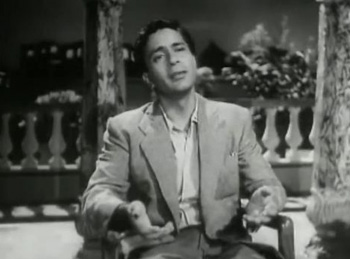
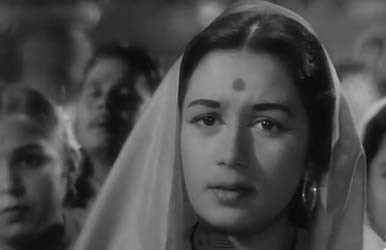
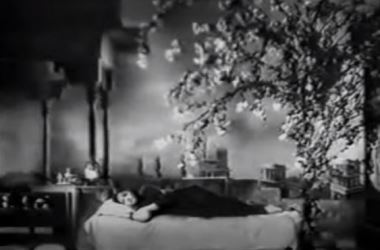
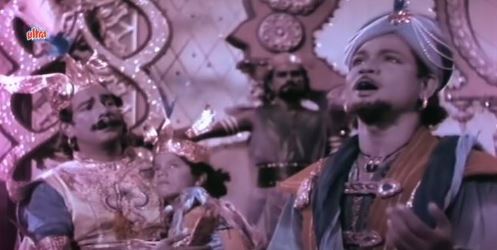
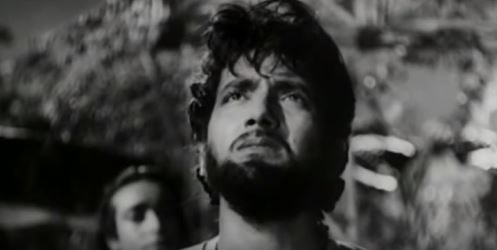
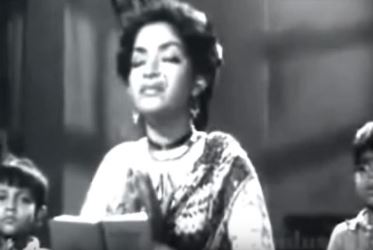
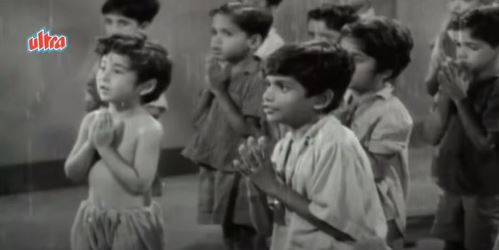


Excellent list many which have gone to become benchmarks. Thank you for compiling these.
2 songs that immediately come to my mind
https://www.youtube.com/watch?v=g-JabS-mozc – Aana Hai to Aa Raah Mein, Naya Daur
https://www.youtube.com/watch?v=-NUXRi3lwAs. – Ishwar Allah Tere Naam | Naya Raasta
LikeLike
Thank you. I love the two songs you’ve posted, too – especially Aana hai toh aa. Beautiful.
LikeLike
Dear Madhu ji,
There are devotional songs and devotional songs and each one has his/her favourite.
When we talk of Bhajans, Meera’s Bhajans are a must. My favourite would be this one, a non-Film Song
And my favourites from Film Bhajans would be this one from “SHABAB”
and this from “YATRIK”
Many many thanks for taking up this topic. With one foot in the grave, listening to chants and Bhajans has suddenly taken a new meaning. You must listen to the Tibetan Chants – they are simply out of this world!
With warm regards and best wishes for a Happier and Healthier 2022.
PARTHA CHANDA
LikeLike
Thank you for these songs. Ramaiya bin neend na aawe was new to me. Bhagat ke bas mein hai bhagwaan I should have remembered, since I’ve watched Shabaab, but that totally slipped my mind. A very good song – and insightful, too, in ways. Peet karna chaahi was new to me too.
I totally agree with you about Tibetan chants! I had heard some earlier this year, and they were mesmeric. Really beautiful.
LikeLike
Dear Madhu ji,
What began with BHAJANS has also included NAATS and QAWWALIS. I suppose the term Bhajan is universal for any Devotional Song.
Back in the early ’50s we 8 year olds were being groomed by a band of Australian Jesuit Missionaries in a Boarding School in far off Hazaribagh. The Fathers instilled the HABIT OF PRAYER in us. It was the Lord’s Prayer before every Class, a set of Prayers at the morning Assembly and another set before Bedtime. Seventy years later I still recall the Prayer of St. Francis of Assisi – “Lord make me an instrument of thy peace; where there is despair, let me sow hope ….”.
It is in the spirit of Prayer to the Almighty that I am including the following songs. Hope you approve :
(MY SWEET LORD – Hare Rama, Hare Krishna)
and this Gospel Song
(by Pat and Shirley Boone)
Hope I make it through.
With warm regards
PARTHA CHANDA
LikeLike
Thank you for these songs – both My sweet Lord and Wonderful time up there are favourites of mine, especially the second one, which I really love! And yes, they fit totally into the theme. And in fact, what you say about devotional songs being the same thing as bhajan: yes, of course. In fact, among Hindi-speaking North Indian Christians, a hymn is always referred to as a bhajan, and there are some really good ones. Here is one of my favourites, Main Yeshu ke saath noor mein chaloonga a very old and much-loved bhajan. Not in a film, sadly:
LikeLike
Hi Madhu. Great list, as always. My favorite among these is Na main dhan chahun. The one I have always been moved by – I am not religious – is Mittar pyare noon written by Guru Gobind Singh ji and beautifully sung by Rafi in Nanak Naam Jahaz Hai.
LikeLike
Thank you for this one, Nishi! I love Rafi’s rendition of Mittar pyaare nu too – I remember getting gooseflesh when I first came across this in Nanak Naam Jahaaz Hai, and even now, listening to it again, I am just as affected by it.
LikeLike
Hi Madhu!
Greetings for the New Year, and may there be peace, joy and laughter (yes!) once
more in our lives.
I am absolutely fascinated by the myriad themes that you focus on.
While it ‘ll take me a while to revisit some of the songs you have selected, I just had to grab this opportunity to reply “tout de suite” with this song :
“Jaise Suraj ki Garmi se”:
This simple yet devotionally eloquent Ram Bhajan is from the Hindi film “Parinay” (1974). This is the original and complete song as sung by Sharma Bandhu in the movie.
———————————————————————————————
Here is some info w.r.t credits for the film “Parinay (1974)
Directed by Kantilal Rathod
Cinematography K. K. Mahajan
Music by Jaidev
Starring Romesh Sharma
Shabana Azmi
Asha Sachdev
Dinesh Thakur
Priti Ganguly
————————————————
Release date
1 January 1974
—————————————————————————
Note: It might be of interest to know that actor Shabana Azmi’s “first ever shoot” for a feature film, after she came out from the Film Institute was for Kantilal Rathod’s “Parinay”. This film was released after Shyam Benegal’s “Ankur”.
For now, hope all of you will like this much-loved Bhajan by the Sharma Bandhu.
(I was not able to get a LINK to any “better” version of the song from the film itself.)
Praba Mahajan
LikeLike
Thank you so much, Praba! Here’s wishing you a very happy New Year as well. May it be a year of good health, joy, peace and contentment for you and your family. Very best wishes.
… and thank you for this song. Yes, possibly one of the best-known bhajans from Hindi cinema.
LikeLike
A great list of bhajans. My most favourite among the list is Gagan jhanjhana raha , though Ae malik tere bande hum and Na main dhan chahoon are very close too.
Among other favourites,
मनमोहन कृष्ण मुरारी, is my favourite too. I guess the screenshot is from that song.
Would this one from Dada, sung by Suman Kalyanpur and composed by Usha Khanna fit?
Allah karam karna
And,
Darshan pyasi aayi dasi from sangdil? I guess it is not a bhajan as such, though sounds like one!
LikeLike
Allah karam karna was new to me, I hadn’t heard this one before. And Darshan pyaasi aayi daasi does qualify – it’s a bit like Jai jai hey Jagdambe mata, in that the women’s dancing in front of the deity’s idol gives it a different flavour, but it’s still a devotional song.
Thank you, Anupji, for these songs. And glad you liked the post. :-)
LikeLike
Dear Madhu ji,
I did post some comments but they seemed to have been gobbled up by WordPress. So, I am making one more attempt. If this too doesn’t succeed, then I’ll assume today is not my day.
My favourite Devotional Songs would be the following three (including a non-Film one)
(non-film composed by Hridaynath Mangeshkar)
(from “SHABAB”)
and
(from “YATRIK”)
With warm regards and best wishes for a Happier and Healthier 2022!
PARTHA CHANDA
LikeLike
Thankfully, it seemed WordPress hadn’t swallowed up your earlier comment; it had just decided that it needed moderation (it does that sometimes, if there are several links within a single comment – I think it seems to sense possible spam). But all’s well.
Happy New Year to you and your family too! I hope you have a very happy, healthy, safe and prosperous 2022.
LikeLike
U missed Waheeda Rehman’s Banwari re..jeene ka sahara tera naam re..mujhe duniyanwalon se kya kam re.
LikeLike
I didn’t miss it, I deliberately left it out. ;-) It’s a good song, but there are others I like more.
LikeLike
You had mentioned you were working on this list when you commented on my post on devotional songs. That didn’t surprise me, but it does surprise me that we have only two songs in common. My list had most of my favourite bhajans (and my list was limited to them, unlike yours) so allow me to plug my post here.
https://anuradhawarrier.blogspot.com/2021/10/my-favourites-devotional-songs.html
LikeLike
Yes! I remember being pretty surprised that we shared only two songs in common in our list. :-) But your list is lovely, too – so many wonderful songs there.
LikeLike
This song (“Karna Fakiri Phir Kya Dilgiri”) from Gulzar’s “Meera” often gets stuck in my ear:
Unsurprisingly, this film has many beautiful devotional lyrics, most of them sung in a very spare and meditative style by Vani Jairam. My favorite from a musical perspective is actually “Shyam Mane Chakar Rakho Ji”; however, “Karna Fakiri” being a little more tuneful, it runs through the head very easily.
LikeLike
I remember watching Meera very long back, as a child – and hating it, because it was absolutely not my type of film. As a result, I don’t even remember the songs. A pity, because this one is really nice. And I like Shyam maane chaakar rakho ji. Incidentally, the same song but with slightly different lyrics – Giridhari mhaane chaakar raakho ji appears in Toofaan aur Diya:
LikeLiked by 1 person
Good songs all except for #5 which I don’t really like. My picks –
Jai Raghunandan Jai Siyaram – https://www.youtube.com/watch?v=LasoyYi19Bc – lovely melody
Darshan Do Ghanshyam – https://www.youtube.com/watch?v=WjXL7sadJMs – raga Kedar really brings out the devotional spirit.
LikeLike
Both lovely songs, and a special thank you for Darshan do Ghanshyam. If I had seen the film, that would have definitely appeared on this list; it’s an absolutely unforgettable song.
LikeLike
Nice post. One of my favorite bhajans is “Jaise Suraj Ki Garmi…”. I think it has already been mentioned here. I was in Hrishikesh when I heard the song for the first time. Sitting by the river, listening to this song was so peaceful.
The other song is Itni Shkti Hame Dena Data.
Here’s a Kannada song that I like. I am always including Kannda songs in your post :-) I hope you don’t mind. Indu Enage Govinda.. by Purandara Dasa
LikeLike
Of course I do not mind you posting Kannada songs (or any non-Hindi songs, really) – I love exploring cinema outside Hindi and English, and am always ruing the fact that it’s so hard to get hold of subtitled films.
Thank you so much for this one, I liked it a lot. Also Itni shakti humein dena daata – classic bhajan, that.
LikeLike
Indu enage govinda was written by saint Raghavendra and nor Purandara Das
LikeLike
Oops. My mistake. Thank you for correcting me.
LikeLike
A nice list of Devotional Songs. Would like to add two more songs (from the early seventies)… Hum ko man ki Shakti dena (from Guddi) and Saancha Naam tera (from Julie). The first was the first song sung by Vaani Jayram, though her ‘Papihara’ song from the same movie was more famous.
Nitin
LikeLike
Glad you liked this list. I was hoping someone would post Humko mann ki shakti dena – very nice song! I must admit I’ve never watched Julie in its entirety, though of course I have heard that song. Nice.
LikeLike
Fantastic collection of devotional songs. And the one I enjoyed most was “Devata Tum Ho Mera Sahara” composed by unheard music composer Jamal Sen. Never listened to this song before. By the way, I’m posting below you-tube links of one Pakistani song and one very old Indian song and hope both qualifies for this topic. Unfortunately both were later copied and copied versions don’t stand anywhere compared to the original creations.
LikeLike
Thank you for these! I had never heard Bhar do jholi meri ya Mohammad – beautiful; it gave me gooseflesh. I don’t remember even hearing any ‘remix’ of this, honestly. But Aayi gori Radhika – that I immediately recognised. This version is so much better than Yashomati maiyya.
LikeLike
In 2015 Indian film “Bajrangi Bhaijan”, this Pakistani song was copied. This original Pakistani song appeared in early seventies and was quite popular in India as well during “Kishore Kumar” era. It’s gramophone record along with other such songs were widely available in India.
LikeLike
Thanks for that information.
LikeLike
Hi! Madhu,
I can recall some of my favourite bhajans from films- not sure if these would qualify under your terms:
1) Truck Driver – Kanha Re Kanha
2) Johnny Mera Naam – Mose Mora Shyam Rootha –
3) Kaajal – Tora Man Darpan
4) Shagird – Kanha Aan Padi Main Tere Dwaar
Regards
Uday
LikeLike
Oh, nice! Of course these qualify. And I am very happy to see the songs from Shagird, Kaajal and Johnny Mera Naam, since all three were on my shortlist too.
LikeLike
Very good selection of devotional songs…….Can I add one of my favorite here ?
Film- Barood(1960), Lata,Hasrat Jaipuri, Khiyyam
Teri Duniya Mein Nahin Koi Hamara Apna
LikeLike
This song was new to me. Thank you so much, this is beautiful.
LikeLike
Hi again,
With ref to this theme, I must admit that I had not realised that there were so many moving and soulful devotional songs, worth hearing and viewing all over again.
Thanks so much – Madhu and all friends out there!
I Would like to include this song from a Basu Chatterjee film: “Apne Paraye”.
(perhaps one of his not-so-well-known films).
“Shyam Rang Ranga Re Har Pal Mera Re”
sung by Yesudas, in Basu Chatterjee’s “Apne Paraye” (1980), based on Sarat Chandra Chattopadhyay’s “Nishkriti”.
Other credits for this film are Lyrics by Yogesh, Music by Bappi Lahiri – his composition for this film has been described as “soul-stirring” (!),
Editing by V N Mayekar, Cinematography by K K Mahajan.
The film features Amol Palekar, Shabana Azmi, Girish Karnad, Utpal Dutt, Bharti Achrekar and Ashalata et al, and a whole bunch of child actors (who are seen here in this song, alongside Amol Palekar).
LikeLike
Just in case the LINK above does not open to the song, here it is, once more, with feeling:
LikeLike
Thank you for this one, Praba! I’d forgotten all about it – beautiful song.
LikeLike
There is some technical glitz. Video is not playing
LikeLike
No problem, this is common with videos where the privacy permissions do not allow it to be embedded. One can always follow the link and watch it on YouTube, as I did.
LikeLike
Madhuji, after reading your post, I was reminded of an early morning live radio show I would frequently host called Aaradhana. Quite a few songs come to mind – Daata Tere Kai Naam (Daata), Insaaf Ka Mandir Hain Yeh (Amar), Jeevan Ke Raaste Hazaar (Savera), Saanware Sunao Bansuri (Basera), Zara Saamne To Aao Chhaliye (Janam Janam Ke Phere), Om Namah Shivaay(Bhairavi). I am deliberately not posting the links as my comment will be marked as spam. All these are popular Bhajans.
LikeLike
Yes, all popular bhajans from films. I especially like Zara saamne toh aao chhaliye and Insaaf ka mandir hai yeh.
LikeLike
I love Parwardigar e alam and specially for the beautiful way it has been sung by Rafi.
Another beautiful bhajan is Tere phoolon se bhi pyar tere kaanton se bhi pyar, sung by Lata Mangeshkar from the film Nastik.
LikeLike
Yes, that song from Nastik is also a good one – I am going to be rewatching that film soon, looking forward to rediscovering it!
LikeLike
Madhu, this nastik is very fond of several of the devotional films on your list – and on Anu’s list too. (Am I really a nastik, though? I consider myself more an agnostic than an atheist, but I don’t know if there is a Hindi word for that. I think that if I were to define myself according ancestral religious heritage, I would say that I’m a yahudi.)
Anyway, I think you know about my favorite devotional song. I was reluctant to mention it here because it’s from across the border, in Pakistan (and I believe this is in Punjabi, not even Urdu), but now that I see that Partha Chanda mentioned George Harrison and Pat Boone (singers who were known to me here in the U.S. long before I fell for South Asian films :) ) – and you seemed fine with that, too – I don’t feel as though I am going against the guidelines all that much. (As you know, this song below has been used in Indian-Hindi films too, but none that I can think of from before 1970. This film, Dilan De Soudey, was released in 1969. The song had also had been used in another Pakistani film twelve years earlier – where this particular melody was first used too – but Noor Jehan’s rendition debuted in Dilan De Soudey.)
By the way, I used to share the Naghma dance with various people (and also posted it on my blog), but that one seems to have disappeared from YouTube, and I have gotten to like the Firdous one more anyway. (Yes, we get to see this Noor Jehan song get danced to twice in the film. And both times are wonderful!)
LikeLike
I knew even before I was through the second paragraph of your comment which song you meant (and I was going, “Oh, goodie! I get to hear Laal meri patt“) What a fabulous song this is – I was hoping someone would post it, so thank you for this! I don’t think most Indians would even recall that this is actually Pakistani, it’s been so popular in India. For me, of course, it doesn’t matter whether it’s Pakistani or not. :-)
Talking about being nastik or not (and no, I don’t know if there’s a Hindi word for agnostic – though there may be, there seem to be Hindi words for everything)… I too love a lot of these devotional songs, but a lot of that love is for the music and the rendition, not so much for the lyrics.
LikeLike
Hey Madhu and also Richard S. !
I was just waiting for the word “agnostic” to be mentioned!
Because that is what KK was. (And so am I).
That’s why, .I am only NOW giving the LINK to a song from the 1983 film “Avtaar”– a devotional song addressed to the goddess Vaishnodevi, which went on to go beyond cult status….(I am saying that with more than a little trepidation!)….
Having said that, I do hope you’ll get a sense of how this song was actually filmed, with the actors – Rajesh Khanna and Shabana Azmi- alongside other pilgrims, enroute to Vaishnodevi, and at the shrine itself.
Credits for “Avtaar” (1983) are:
Direction: Mohan Kumar
Lyrics: Anand Bakshi,
Music: Laxmikant – Pyarelal
Cinematography: K K Mahajan
“Chalo Bulawa Aaya Hai”: sung by Narendra Chanchal, Mahendra Kapoor and Asha Bhonsle
The LINK:
LikeLike
Oh, gosh, yes. How popular this song was, and continues to be!
LikeLike
I think in India the first really popular version was Runa Laila’s version on Doordarshan ..
LikeLike
The clip above is the older one, but here is a video clip, later , but Doordarshan
LikeLike
Yes, this one is for me the first rendition I remember hearing! Runa Laila’s version was so popular. :-) I must admit, I still love it.
LikeLike
Wow so good to be back on here, brings back memories :) the only one I know from this list and thereby like the most is the one from Do Ankhen barah haath. I’ve always loved this one from kaajal
LikeLike
It’s so good to have you back, bollywooddeewana! (Are you thinking of restarting your blog? I hope so!)
And yes, Tora mann darpan kehlaaye is a good song. Very nice!
LikeLike
Good question lol, I’ve thought of it a few times but I just don’t know if I can be as dedicated or consistent . I’ve started watching bollywood a lot more than I have in years so let’s see how it goes
LikeLike
If you do decide to start again sometime, remember to let me know – would love to read your writing again!
LikeLike
@Prabha, I was just reading a book today where your husband was spoken very highly of. :)
LikeLike
Hi Anu,
So good to hear that….. You’ve made my day!
Anu, I have a request.. Would you please tell me the title of the book, author etc.? As a researcher ( from the ‘old school’ to begin with..) I have seen/ read almost all that has been written abt KK. Hence the request… If you’d prefer you could write to me at my Email Id:
praba.mahajan@gmail.com
LikeLike
Couple of additions here..
A much loved Kashmiri ‘Naat’ Ba Khuda Saeri Khodaai… by Shamim Dev (Azad) , first heard on Doordarshan Srinagar in early 80s…
Managed to find a clipping , so sharing here.
Shamim Dev (azad) was /is a very talented singer and was much loved. She had had to give up her public singing career after getting married to Ghulam Nabi Azad ! (Another case of political patriarchy) .
Also interesting is the clip for its archival value, where you see a full orchestra and chorus for a Naat , and the attire is respectful but not hardline… this is what Kashmir was… and now look where it is !!!
LikeLike
This clip may be late 70s…
LikeLike
Thank you so much for this, ak. Took me right back to our days in Srinagar, when we used to (very occasionally) watch DD Srinagar. Though this is far better than the sort of music we invariably ended up coming across. Beautiful, and I agree about what you write about it not being hardline… gosh, when you compare this with Kashmir today. :-(
LikeLike
Another favourite is this ‘Kirtan’ from Naya Din Naya Raat , Krishna Krishna
Although the context is not very devotional , but the song is… and beautifully sung.
LikeLike
Oh, yes. I had forgotten this one. But it’s beautifully sung, a really good song.
LikeLike
Another beautiful Sarawati Vandana (dont know if this can be called a Bhajan )
Mata Saraswati Sharda from Alaap…Two versions, Yesudas, Lata. Right in the beginning and then Lata and Dilraj Kaur , right in the end..
LikeLike
I hadn’t heard this one before. :-)
Just listening to this Saraswati alaap – a Christian singing there, and a Sikh – I was thinking that so many of our devotional songs have been sung (and with so much feeling) by people who aren’t of that religion. The sort of secularism that Hindi cinema actually managed to do so effortlessly, it seemed. Still does?
LikeLike
Hopefully…
LikeLike
And rounding off with this stunning Aarti (differentiating between a Bhajan, Kirtan, Aarti , Bhent is nuanced ) by Guru Nanak Dev Ji , which legend has, He composed on the beach of Jagannath Puri in adoration of the Lord, as the Aarti parallelly was being carried out in the shrine.
Here is a clip depicting same from the movie Nanak Shah Fakir ..
LikeLike
I have to admit I have absolutely no idea of the difference between all those things… but since all (I assume) entail some form of devotion, some praise to a deity, then they all fit this theme.
Thank you for Gagan mein thhaal; so stirring, and so beautifully sung.
LikeLike
‘Tu Pyar ka Sagar hai’ and ‘Allah tero naam’ are my favourite too.
I also find ‘Sancha naam tera’ from ‘Julie’ very addictive, if you can call a bhajan addictive.
‘Dhanya bhaag seva ka avsar paaya’ from ‘Sur Sangam’ is the one being sung in mehfil but for me it is devotion personified.
And I cannot resist to add some of my favourite marathi devotional songs.
‘Vithu Mauli Tu Mauli Jagachi’ from ‘Are Sansar Sansar’ sung by Sudhir Phadke, Suresh Wadkar & Jayant Kulkarni. Movie is loosely based on ‘Mother India’ where titular role addressed by legendary actress (late) Ranjana and you can see
Mr. Yogi (Mohan Gokhale) as her younger son. The song makes me nostalgic about an era where entire village used to join bhajan sandhya for village deity.
Next one is ‘Ekvaar pankhavaruni firo tuza haat’ from movie ‘Vardakshina’.
It is losely translated as ‘For once stroke my wings as you are my final abode’.
Sung by Sudhir Phadke and portrayed by Ramesh and Seema Deo in movie.
Maharashtra has a great many devotees of Lord Vitthal. These devotees came from every cast/creed and were united in their devotion. They were followed by large population and this was the first ever social engineering of times and more effective than anything else. Eventually these devotees came to be known as Saints and
their creations are called as ‘Abhang – something which cannot be broken’.
And so were they. For generations, these abhangs were sung by Vaarkaris and permeated into marathi mind.
Every singer worth his/her salt had sung their version of number of abhangs.
‘Bolava Vitthal’ is one such abhang by Saint Tukaram who was contemporary of Chhatrapati Shivaji’ and it is brought to life by Gan Saraswati Kishori Amonkar.
‘Abir Gulal Udhalit Rang’ written by Saint Chokhamela and sung by Pt. Jitendra Abhisheki
‘Maze Maher Pandhari’ and ‘Kaya hi Pandhari’ written by Saint Eknath and sung by Pt. Bhimsen Joshi.
LikeLike
Thank you so much for these songs, especially the Marathi ones, none of which I had heard before. Beautiful.
LikeLike
With thousands of devotional songs available to choose from, it’s indeed no easy task to select just a handful. I have made my own list. The songs of your list are all very good and I am familiar with the most of them (and like them). I appreciate your efforts.
LikeLike
I am so glad you enjoyed these, and thank you for all the songs you posted!
LikeLiked by 1 person
One song from my side:
LikeLike
Oh yes, Tora manwa kyon ghabraaye is a beautiful song. I invariably forget about this one when remembering Sadhna, but a wonderful song.
LikeLiked by 1 person
One more:
LikeLike
Oh, yes. Hey rome-rome mein basnewaale is a lovely song too. It was on my shortlist. :-)
LikeLiked by 1 person